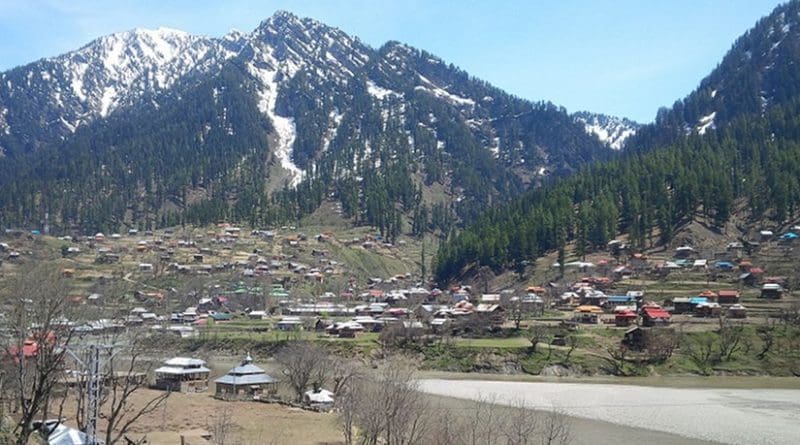Anti-Militant Protests Rock Kashmir’s Neelum Valley
By Zafar Iqbal
Anti-militant protests rocked Pakistani Administrated Kashmir’s Neelum Valley when people came out on roads and demanded evacuation of activists of some banned militant outfits from their area.
Protesters declared the presence of few armed outsiders as a “threat for peace agreement between India and Pakistan on Kashmir borders.”
Eyewitnesses say that local markets were closed and transport system was affected by the call which was given by civil society organisations to voice against the appearance of some armed strangers. Agitators have asked government to free the area from armed insurgents within four days.
The protests follow few incidents of shootings when Indian posts were attacked by rockets by some unknown people.
Locals fear that militant attacks and activities of some outlawed Islamic groups can cause retaliatory fire from the Indian side that may threaten a 2003 ceasefire and life in the valley.
In Pakistani Kashmir 240 kilometres long, narrow Neelum valley, which lies within the firing range of soldiers in Indian-administered Kashmir along Line of Control (LoC), has been a victim of retaliatory shelling from the Indian troops stationed just a stone throw away across the River Neelum (Kishanganga).
Between 1990 and 2003 when militancy in Indian Kashmir was at its heights, civilian population of this valley was the worst victim of conflict. In these years unprovoked shelling from Indian side destroyed homes, hospitals and schools and forced people to displace or spend most of their daily lives in bunkers. A large numbers of people were killed, wounded or lost their limbs and livelihood was crippled.
In this context, whenever there is similar combative development in the area, people recalls the sad recollections of pre-peace decade.
There were regular clashes across the LoC before the nuclear-armed neighbours -India and Pakistan, agreed to a ceasefire in 2003. Since the peace agreement Indian and Pakistani armies exchange only sporadic fire and there have been just a handful of clashes over the past few years.
However, last month tension escalated over trading of fires between both countries. At least six soldiers were killed from both sides and few casualties and injuries of civilians were also reported. This shelling also disrupted the LoC trade and travel activities in Poonch region which resumed after few weeks.
Earlier to this latest demo in Neelum Valley, last week a joint meeting called by local officials, including Pakistani spy agency Inter Services Intelligence(ISI ) staff, furious representatives of local civil society promised to take required measures against the militants to avoid potential tension among Indian and Pakistani militaries.
The two -pages draft comprising the minutes of the meeting indicates that civilian government is committed to follow policy of the onslaught against Islamic insurgents in Pakistan and its administrated Kashmir.
However, non-stake actors like few banned Islamic organisations persist to thwart government’s stance of distancing militarily from Kashmir insurgency.
In the wake of 9/11 Pakistan banned many Islamic organisations including Lashkar-e -Taiba (LeT) that remerged with title ‘Jamaat-ud-Dawa (JuD)’. The founder of the LeT Hafiz Saeed refutes any affiliation with the Lashkar and insists that his organisation the JuD is involved in charitable and welfare work within Pakistan and its administrated Kashmir. In April this year the US has offered a $10m bounty for Hafiz Saeed. His alleged role in the 2008 Mumbai attacks has already halted India-Pakistan peace process.
Besides, alleged Infiltration along the LoC is vey contested component of fragile Indo-Pak relations. India blames Pakistan for sponsoring Kashmiri militant groups through so-called armed access on Kashmir borders. Pakistan denies charges and pledges moral, diplomatic and political support for the ‘right of self-determination for Kashmiris, calling Kashmir’s current turmoil an ‘indigenous movement’.
Since 2004 significant decline has been observed in Kashmir militancy and it has shifted towards more peaceful and none-violent battle where Kashmiri Muslim population advocates for a separate independent country-free from Indian and Pakistani control.
Indian military and government also acknowledge an evident fall in suspected infiltration in Kashmir from Pakistani side. Recently, an Indian army general has admitted impossibility of zero level of militant activity in Kashmir. No doubt, current public resentment in Neelum Valley over appearance of mysterious Islamic radicals is a reflection of this candid admittance. And also a chilling moment for those who wish sustained peace in this region.


I am glade that the Author highlighted a very critical issue that has been hindering the social and economical development of the Nation for decades. Such unwise ventures should be discouraged and a meaningful dialogue should be established to reach a mutually agreed accord.
The Country that is loosing consistently is Pakistan as a result of such incidences, while the India in spite of facing many issues, not only successfully handling them but is also paving its way towards stepping along with the international community.